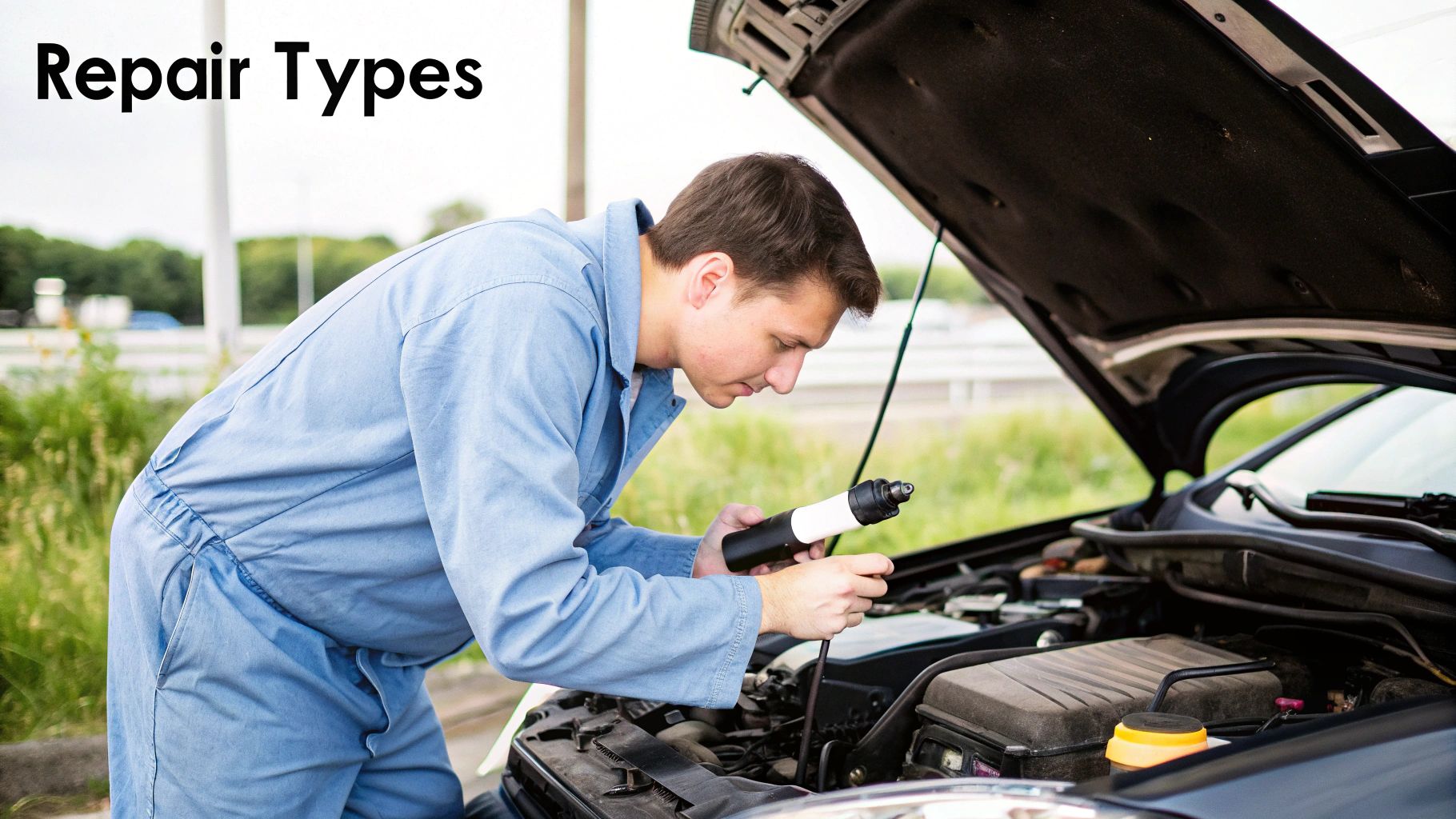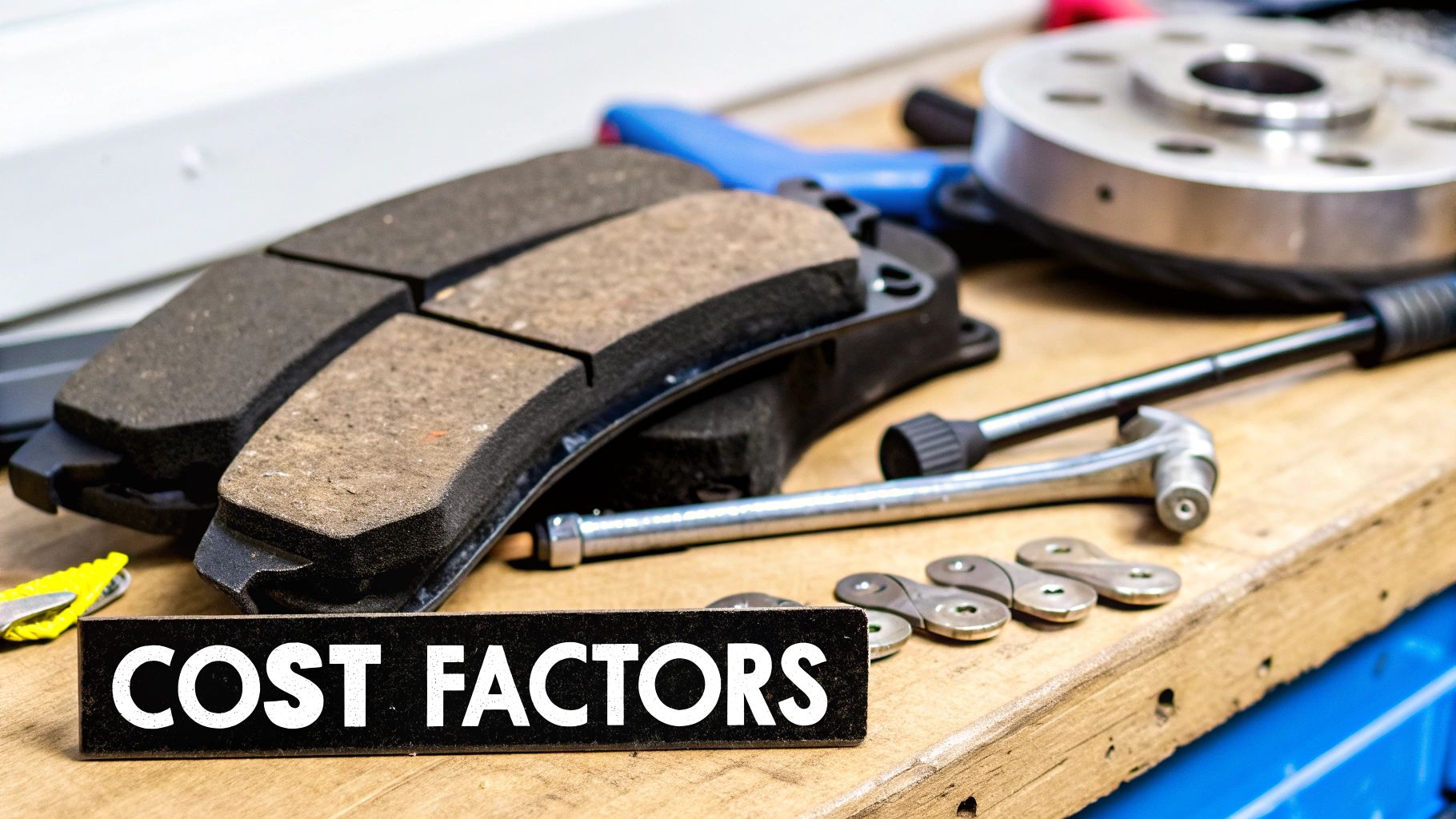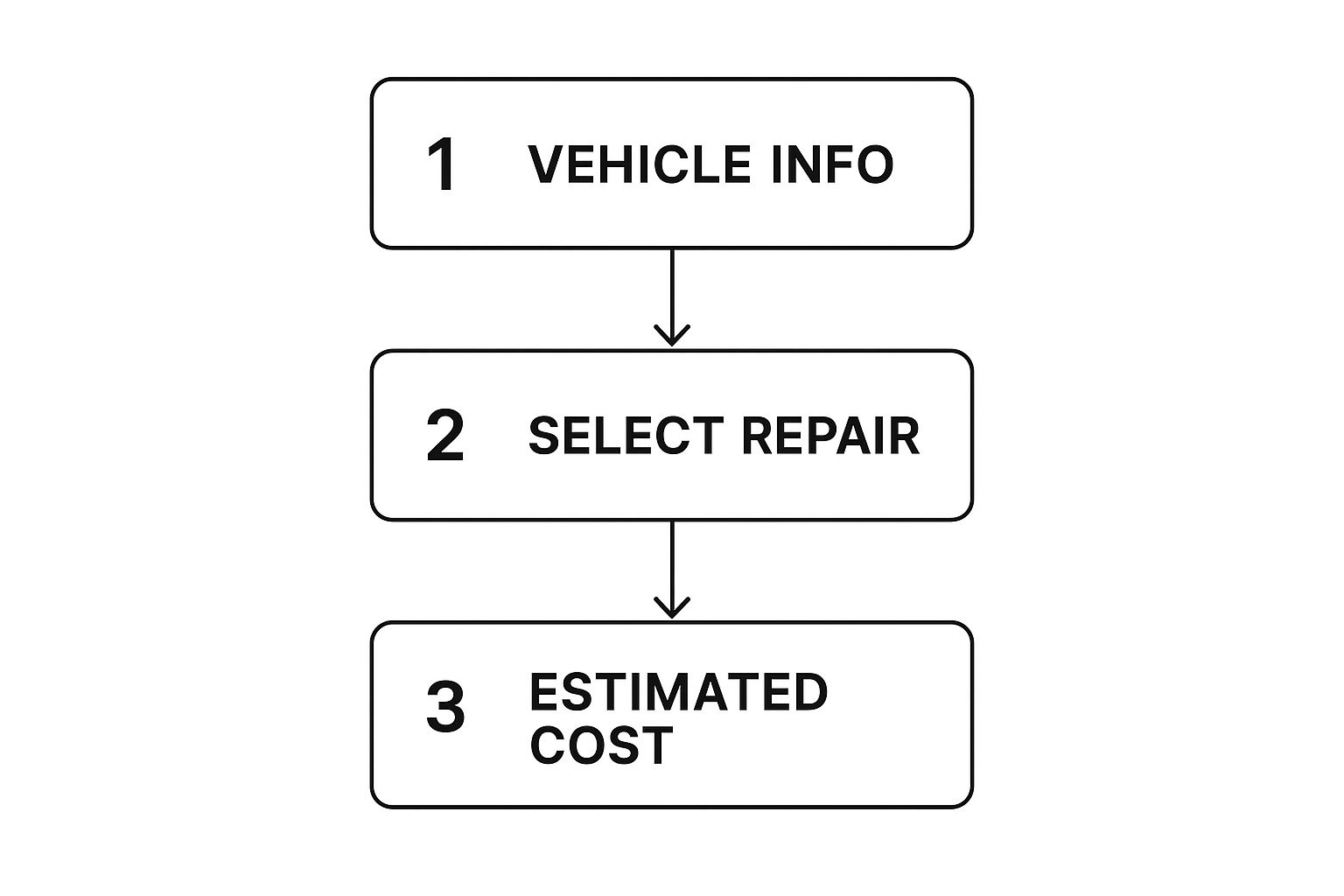Your Guide to a Car Repair Cost Estimator
- coledem
- Jul 19, 2025
- 13 min read
Let's be honest, few things sink your stomach quite like an unexpected garage bill. That looming fear of the final invoice is a universal feeling for car owners. This is precisely where a good car repair cost estimator becomes your best friend, giving you a realistic idea of the bill before it lands in your hands. Think of it as your first line of financial defence.
Why Are UK Car Repair Bills So Unpredictable?
If you're a driver in the UK, you have probably noticed that repair costs aren't as straightforward as they used to be. A seemingly minor problem can easily balloon into a hefty bill, leaving you scratching your head. This is not just a string of bad luck; it is the new reality, driven by major changes in how our cars are built.
Modern vehicles are technological marvels, but that sophistication comes at a price. They are less like the simple mechanical machines of yesteryear and more like computers on wheels, packed with sensors and complex electronics. That single warning light on your dash could signal any number of issues, each with its own price tag for a fix.
This complexity hits your wallet in two main ways:
Specialised Labour: Mechanics are now highly skilled technicians who need constant training to stay on top of the latest technology. Garages also have to shell out for expensive diagnostic equipment. Naturally, that level of expertise costs more.
Costly Components: Things like advanced driver-assistance systems (ADAS), high-tech engine parts, and integrated infotainment screens are much more expensive to replace than their older, simpler equivalents.
The Soaring Costs Behind Every Repair
The numbers don't lie. Recent data paints a clear picture of just how much repair costs have climbed. An analysis of over 31,000 insurance claims found that the average UK car repair bill shot up from £4,162 in 2019 to £5,191 by early 2025. That is a staggering 24.7% increase, fueled by rising parts prices and higher labour rates. You can dig into the specifics by checking out the insights on repair costs from Auto Claims Assist.
This steep climb has a knock-on effect: more cars are being written off. The percentage of vehicles declared a total loss after an accident jumped from 58% in 2019 to 66% by mid-2025, simply because fixing them is no longer economically viable.
In this climate, just guessing what a repair might cost is a recipe for financial stress. Using a reliable car repair cost estimator removes that uncertainty. It gives you a solid, data-driven baseline so you know what you are potentially up against. Armed with that knowledge, you can budget properly, confidently compare quotes, and walk into the garage feeling prepared, not panicked.
Decoding Your Garage Bill: What You Actually Pay For

When a repair quote lands in your hands, it can look like a confusing jumble of industry jargon and figures. But once you understand the core components, it all starts to make sense. Any garage bill, whether from a main dealer or your local independent, boils down to three key things: the parts, the labour, and any diagnostic work needed to figure out the problem in the first place.
Using a car repair cost estimator online can give you a solid ballpark figure before you even speak to a mechanic. But knowing what goes into that final number gives you the ability to have a much clearer, more confident conversation with the garage. It is all about transparency.
The Cost of Car Parts
First up, let us talk about the physical components. The cost of parts is often the biggest variable on your bill, and it usually hinges on a single choice: using parts from the original manufacturer or going for aftermarket alternatives.
Original Equipment Manufacturer (OEM) Parts: These are the real deal—identical to what was fitted in the factory, supplied directly by your car's maker. They guarantee a perfect fit and perform exactly as intended, but they almost always carry the highest price tag.
Aftermarket Parts: These are made by independent companies, not the car manufacturer. They are designed to do the same job as OEM parts, but quality and price can be all over the map. Any decent garage will stick to reputable aftermarket brands that offer a great blend of reliability and value for money.
This choice can dramatically alter your final bill. For instance, a set of genuine OEM brake pads for a popular family car might set you back £80, while a quality aftermarket equivalent could be around £50. On bigger, more complex jobs, that difference really starts to add up.
Understanding Labour Rates
Labour is simply the charge for the technician's time, skill, and expertise. This is not a one-size-fits-all cost; it can vary greatly from one garage to the next for a few important reasons.
The main driver is almost always location. A garage in central London has far higher rent and business rates than one in a small town in Bedfordshire, and their hourly rates will naturally reflect this. On top of that, a main dealership—with its brand-specific tooling and training—will nearly always charge a higher hourly rate than a trusted local independent.
The complexity of the job is the other big piece of the puzzle. Swapping an air filter might only take 15 minutes of a technician's time, but a full clutch replacement could easily take five or six hours. The total labour cost is a simple calculation: the garage's hourly rate multiplied by the standard time allocated for that specific repair.
A key thing to remember is that a higher labour rate does not automatically mean better service. Often, it just reflects higher overheads or specialist knowledge. For routine maintenance and common repairs, a good independent garage can offer significant savings without compromising on quality.
Here is a rough idea of how those hourly labour rates can differ across the UK.
Typical UK Garage Labour Rates by Region and Type
This table illustrates the average hourly labour costs a driver might encounter, showing variation based on the garage's location and specialisation.
Garage Type | Major City (e.g., London, Manchester) | Suburban/Town | Rural Area |
|---|---|---|---|
Main Dealer | £120 - £200+ | £90 - £140 | £80 - £120 |
Independent Specialist | £80 - £130 | £70 - £100 | £60 - £90 |
Local Independent Garage | £65 - £100 | £55 - £85 | £50 - £75 |
As you can see, choosing a local independent garage in a less urban area could easily cut your labour costs in half compared to a main dealer in a major city.
Why You Pay for Diagnostics
Finally, don't be surprised to see a separate line item for diagnostics, especially with modern cars. That little warning light on your dashboard could signal one of dozens of potential faults. A diagnostic fee is not just for plugging a computer into your car's port; it covers the mechanic's time to run tests, perform physical checks, and use their experience to accurately pinpoint the root of the problem.
Think of it as a good investment. Without proper diagnostics, the mechanic is guessing, which can lead to fitting parts you don't need and, ultimately, wasting your money. A diagnostic check makes sure the repair targets the actual fault from the get-go. If you're keen to learn more about vehicle maintenance, our guide on what every UK driver needs to know about car servicing in 2025 provides some excellent background.
How Your Car's Make and Model Drive Repair Bills

The final figure on your garage bill is not just about the work done; it is heavily influenced by the badge on your car's bonnet. It is a common scenario: two cars roll into the garage with almost identical problems, yet one owner leaves with a bill that is worlds apart from the other. Your specific make and model are a huge piece of the puzzle for any accurate car repair cost estimator.
So, what is behind this difference? It really boils down to a few key things. Premium or luxury brands often build their cars with unique, specialised parts that you simply cannot swap with other vehicles. These components cost more to make and, naturally, more to buy. The engineering can be far more complex, too, turning what would be a straightforward job on a common car into a much more labour-intensive task on a high-end model.
Why Brand And Popularity Matter
A car's popularity has a direct, and often significant, impact on the availability and price of its parts. If you drive one of the UK's most common models, you are in luck. There is a competitive market for both genuine and aftermarket components, which is great for keeping prices in check. On the flip side, sourcing parts for rarer or imported vehicles can be a real headache and will almost certainly cost you more.
This is not just anecdotal; recent UK market data tells the same story. A 2024 analysis revealed that the average repair cost for the UK’s ten most popular used cars shot up by nearly 20%. But here is the interesting part: the increases were all over the place depending on the model.
The Ford Fiesta saw its average repair cost jump by 25%.
The Vauxhall Astra's average bill climbed even higher, by 28%.
The Volkswagen Polo's repair costs grew by just 3%.
These numbers make it crystal clear how your choice of vehicle can shape your long-term ownership expenses.
This variability is precisely why any car repair cost estimator worth its salt will demand your exact vehicle details. A vague "family hatchback" estimate is practically useless when a Ford Focus and a BMW 1 Series have completely different cost profiles for the exact same repair.
Thinking about how a car's brand affects repair bills is especially important for high-end vehicles, where finding the right expertise is crucial. For those with specialised needs, looking into options like the Best Luxury Cars Repair Shops in Dubai can highlight the kind of dedicated service required.
The car you choose has financial implications that stretch far beyond the initial price tag. Getting to grips with these differences means you can anticipate future maintenance costs far more effectively. For some pointers on finding a trustworthy service centre that truly understands these nuances, have a read of our article on https://www.krauseautos.co.uk/post/choosing-a-local-garage-in-2025-a-guide-for-everyday-drivers.
A Practical Walkthrough of a Repair Cost Estimator
Knowing the theory behind repair costs is useful, but seeing a car repair cost estimator in action is what really counts. These online tools are refreshingly straightforward, designed to take the guesswork out of repair bills. They turn what could be a complicated calculation into a simple process that anyone can use.
Let us run through a real-world example. We will go from that nagging feeling of "how much is this going to cost?" to having a solid figure you can use to budget and confidently compare quotes from local garages.
Pinpointing Your Exact Vehicle
First things first, the estimator needs to know what car you have. Without this, any estimate would be a wild guess. Most tools make this incredibly simple with two options:
Enter Your Registration Number: This is by far the quickest and most accurate way. Your reg number pulls up the precise make, model, engine size, and year of your car from a database. Easy.
Select Your Car Manually: If you don't have your reg to hand, you can always pick your vehicle's details from a few drop-down menus. Just try to be as accurate as possible.
The whole point is to feed the system the right information from the get-go.

This process is designed to guide you smoothly from identifying your car to getting that all-important price range.
Specifying the Job and Your Location
Once the tool knows your car, you need to tell it what is wrong. You will typically see a list of common repair areas, such as "Brakes," "Clutch & Gearbox," or "Engine & Cooling."
From that list, you narrow down to the specific job. So, under the "Brakes" category, you might find an option for "Brake Pad Replacement (Front)."
Finally, you will pop in your postcode. This is a critical step. As we have discussed, labour rates can change quite a bit depending on where you are in the country. The tool uses your location to tailor the estimate, making it much more relevant to the prices you will actually be quoted.
Understanding the Estimate You Receive
After you have put in all the details, you get to the moment of truth. The car repair cost estimator crunches the numbers and gives you the results. You will almost always see a price range, not one single figure. This is a good thing – it reflects the real-world differences in labour rates and parts costs you will find between various local garages.
For a front brake pad replacement, you might see an estimated range of £120 - £180. The lower end likely points towards an independent garage using quality aftermarket parts, while the higher figure often reflects a main dealer using genuine OEM parts.
The best part is that the estimate is usually broken down, showing you the expected costs for both parts and labour. This transparency is gold. It gives you the power to understand precisely what you are paying for. If a garage then quotes you £250 for the same job, you are no longer in the dark. You can go back and ask informed questions to understand why their price is so much higher than the estimated range.
Budgeting for Common and Unexpected Car Repairs

Once you have a grasp of how garages tally up a repair bill, you can shift from simply reacting to car trouble to actually planning for it. Let's be realistic: financial planning for your car is not about saving for every single thing that could go wrong. It is about creating a sensible safety net. That buffer is what softens the financial blow when a sudden breakdown happens.
A good car repair cost estimator is a brilliant tool for this. It gives you a data-backed starting point for common jobs like a clutch replacement or brake work, which helps you set realistic savings goals. This turns the vague worry of "what if?" into a structured, achievable part of owning a car.
Recent research from the RAC really drives this point home. They found that a staggering 59% of UK drivers get hit with unexpected repair bills each year, and the average cost is a hefty £617. What are the main culprits? Tyre replacements top the list (64% of drivers), followed by brake repairs (24%) and suspension issues (21%). It is easy to see how disruptive a bill of that size can be for a household budget.
Proactive Budgeting Methods
Waiting for a dashboard warning light to flicker on before you think about repair costs is a sure-fire recipe for stress. A much better approach is to be proactive and build up some financial resilience for when that inevitable garage bill lands on your doormat.
Here are a couple of straightforward methods:
Set Up a Dedicated Car Fund: This is simple but incredibly effective. Open a separate savings account just for car maintenance and repairs. Channelling a small, regular amount—even £25-£50 a month—can quickly build a pot of cash that will cover most common jobs without you needing to dip into your main budget.
Add a Vehicle Repair Line to Your Budget: Treat potential car repairs just like any other monthly outgoing, like your council tax or electricity bill. By formally adding a "car repair" line item to your household budget, you turn saving into a consistent habit, not just an afterthought.
Having a dedicated fund of a few hundred pounds can be the difference between a minor inconvenience and a major financial headache. It gives you the freedom to authorise necessary repairs without delay, keeping you safely on the road.
Creating Your Financial Safety Net
The goal is to avoid being stuck between a rock and a hard place, having to choose between a needed car repair and another urgent bill. Even a small, consistent savings effort makes a huge difference over time.
While a car repair cost estimator is your best friend for forecasting direct repair expenses, it is also wise to understand the bigger picture of car ownership costs. For example, knowing why auto insurance rates keep rising helps you build a more complete financial overview of your total vehicle expenses.
By combining the foresight an estimator provides with a disciplined savings plan, you put yourself firmly in control. For more ideas on looking after your car without breaking the bank, take a look at our guide: https://www.krauseautos.co.uk/post/cost-effective-car-repairs-2025-smart-tips-for-every-driver. You are not just budgeting for repairs; you are investing in your own peace of mind.
Frequently Asked Questions About Car Repair Costs
Even with the best online tools and a bit of research, you are bound to have a few questions when that repair bill lands in your hands. It is completely normal. Let us tackle some of the most common queries I hear from drivers, so you can feel more in control of the situation.
Can I Challenge a Garage Quote?
Absolutely. If a quote seems way off the mark, you have every right to question it. Say you have used a car repair cost estimator and the garage's price is much higher. There is nothing wrong with politely asking for an itemised breakdown.
This is not about starting an argument; it is just about getting clarity on what you are paying for. A good, trustworthy garage will happily walk you through its labour rates and the cost of the parts they are using. Walking in armed with an independent estimate just gives you a sensible starting point for that conversation.
What if the Final Bill is Higher Than the Quote?
This is a big one. A garage should never carry out extra work that racks up the cost without your say-so. If the final bill comes back higher than what you agreed to, you need to ask why, immediately.
Sometimes, a mechanic uncovers a related (or unrelated) issue while working on your car. It happens.
But here is the crucial part: the garage is obligated to stop, contact you, and explain the new problem and the extra cost. They must get your explicit permission before they pick up the tools again. You are not on the hook for unauthorised work.
How Can I Save Money on Repairs?
Getting a fair price with a car repair cost estimator is a great first step, but there are other savvy ways to keep your costs down.
Always ask if they can use quality aftermarket parts. They often do the exact same job as Original Equipment Manufacturer (OEM) parts but for a fraction of the price.
For any non-urgent jobs, shop around. Getting quotes from a few different independent garages can save you a surprising amount of money.
Some repairs catch us all by surprise. A common question we get is how much a replacement car key costs, as it is a frequent and unexpectedly pricey problem. It also pays to know what your vehicle’s cover includes. Understanding your rights can be a huge help, and our guide on car warranty and repairs for every UK driver is packed with useful information on this.
Navigating car repairs is much less stressful when you have a partner you can trust. At Krause Autos, we pride ourselves on giving clear, honest pricing and expert service to drivers across Sandy and Bedfordshire. Whether you are due for an MOT, a full service, or need some complex diagnostic work, we are here to help. Get in touch with our friendly team today by visiting us at https://www.krauseautos.co.uk.





Comments